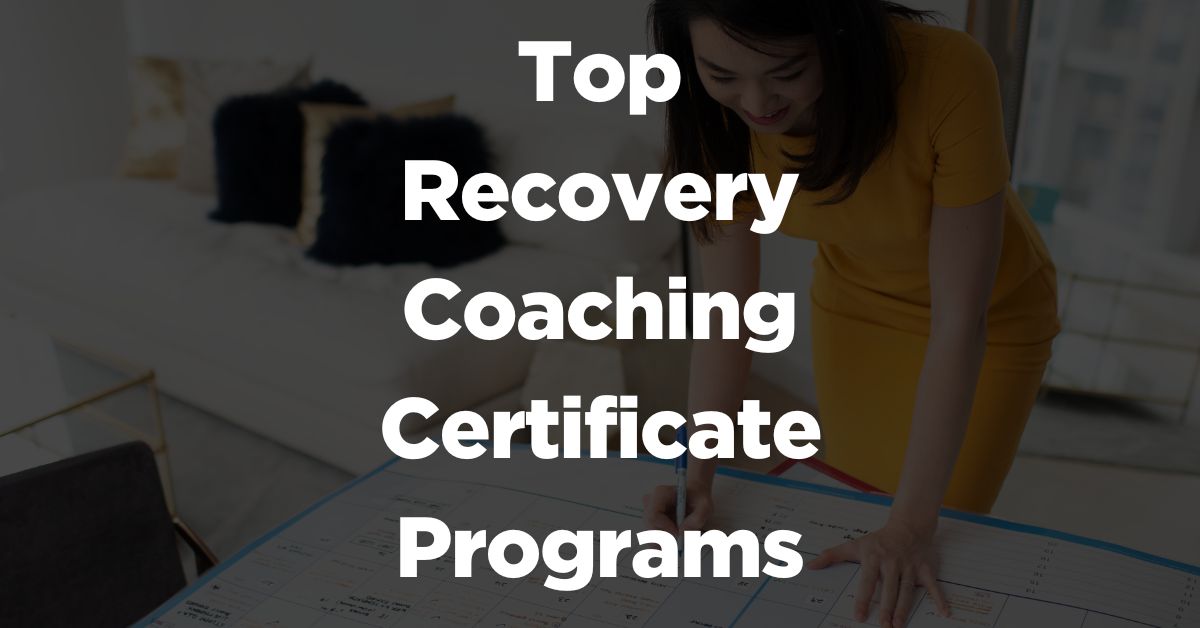If you’re interested in becoming a certified recovery coach, you’re in the right place.
In this guide, you’ll learn:
- The BEST recovery coaching certification programs
- How to choose a program
- How to become a recovery coach
Ready? Let’s dive in!
The best certification programs are:
- IAPRC (Established and accredited certification program)
- The Academy for Addiction Professionals (30-hour training program)
- CCAR (5-day training program)
Jump straight to the certifications.
What is a recovery coach?
A recovery coach helps clients overcome their addictions and find long-term, sustainable recovery.
Most people think that recovery coaches only work with drug, alcohol, or substance addictions. And while they do help with those addictions, they aren’t the only ones.
Get the Ultimate Guide
for building a
6-Figure Coaching Business so you can achieve more freedom!
Other addiction niches that recovery coaches help with include:
- Gambling addiction
- Sex or love addiction
- Shopping addiction
…And more.
However, it’s important to note that recovery coaches and therapists aren’t the same thing.
Therapists are licensed professionals with a psychology and/or counseling degree, while recovery coaches aren’t always certified.
Instead, they use their own life and/or work experience to help others through recovery.

Now that you know what a recovery coach is, let’s look at coaching certifications.
Top Recovery Coaching Certification Programs
Below, you’ll find some of the best recovery coaching certification programs you can take. (In no particular order.)
Disclaimer: I haven’t taken these certification courses.
Instead, I’m recommending them based on their reputation within the coaching industry and reviews.
| Program | Organization | Accreditation | Duration | Price |
|---|---|---|---|---|
| Professional Recovery Coach Course (CPRC) | IAPRC | ICF, IC&RC, NAADAC, Florida Department of Health Licensure Board | Self-paced | $4,497 |
| National Certified Peer Recovery Support Specialist (NCPRSS) | NAADAC | NAADAC | Depends on the program | $620 |
| Recovery Coach Academy Training Program | CCAR | NAADAC | 5 days | $850 |
| Certified Professional Recovery Coach Dual Program (CPRC) | IAPRC | ICF, IC&RC, NAADAC, Florida Department of Health Licensure Board | Self-paced | $5,097 |
| Certified Addiction Recovery Coach (CARC) | ICAADA | ICAADA | 7 days | $425 |
| Recovery Coach Training | The Academy for Addiction Professionals | NAADAC | 30 hours | Available on request |
Professional Recovery Coach Course (CPRC)
IAPRC

The IAPRC’s Professional Recovery Coach Course (CPRC) was created for anyone looking to specialize in addiction recovery, including counselors, therapists, and managers. You’ll learn about the neuroscience of recovery, professional recovery coaching competencies, and family issues in recovery. You’ll also take part in online skill sessions under the guidance of a Master Professional Recovery Coach.
They also offer a Certified Professional Coach (CPC) course, which will arm you with the skills needed to become a professional life coach and launch your business.
Duration: Self-paced
Price: $4,497 for CPRC; $1,497 for CPC
Accreditation: ICF, IC&RC, NAADAC, Florida Department of Health Licensure Board
Mode of delivery: Online
Key features:
- Six modules
- Downloadable course materials
- Mini-video courses
- Live skills practice sessions
- Self-discovery worksheets
- iCoachRecovery Community membership
National Certified Peer Recovery Support Specialist (NCPRSS)
NAADAC

Peer Recovery Support Specialists are in active recovery from substance use or mental health disorders themselves, which makes them the ideal partners for those in recovery.
Instead of a course, this is just the certification, meaning you’ll take one exam. The exam is made up of 125 multiple-choice questions that touch on:
- Knowledge about the role (25%)
- Recovery practice concepts (40%)
- Pharmacology (15%)
- Ethics (20%)
There are a few eligibility requirements that you’ll need to meet to take the exam, including:
- At least a high school diploma or GED
- A minimum of two years of recovery from substance abuse or mental health disorders
- 200+ hours of direct peer recovery support experience
- 6 hours of ethics training and 6 hours of HIV/other pathogens training in the last six years
- Two references
- Passing score on the NCPRSS exam
For the complete list of requirements, click here.
Price: $235 application fee, plus $235 initial credential fee, $150 testing fee, and $200 renewal fee every two years
Accreditation: National Certification Commission for Addiction Professionals (NCC AP)
Mode of delivery: In-person; Find a location here
5-Day Recovery Coach Academy Training Program
CCAR

This program is perfect for anyone who’s looking to fast-track their certification.
In just five days, you’ll learn to guide, mentor, and help others looking to start or keep going in their long-term substance abuse recovery journey through engagement, active listening, and questioning training. You’ll also take a look at your own experiences and learn to use them in a coaching setting.
Duration: 5 days of four-hour sessions
Price: $850
Accreditation: NAADAC, RCP, and New York Certification Board
Mode of delivery: In-person, small classes
Key features:
- Training manual provided
- 30 international continuing education hours
- Completion certification from CCAR and an accreditation certificate from CPD
- Membership and access to the Recovery Coach Community
Certified Professional Recovery Coach Dual Program (CPRC)
IAPRC

I mentioned earlier that the CPRC offers a Professional Recovery Coach Course and a Certified Professional Coach Course. What I didn’t mention is that you can get both certificates in their Dual Program.
In the Dual Program, you’ll first complete the Certified Professional Coach training, which will walk you through the skills and tools needed to become a practicing coach and run a successful business.
Once you’ve completed that module, you’ll move into the Certified Professional Recovery Coach training portion. In it, you’ll learn everything from the science behind recovery to navigating family issues and participate in live online practice sessions.
Duration: 7 modules, self-paced
Price: $5,097
Accreditation: ICF, IC&RC, NAADAC, Florida Department of Health Licensure Board
Mode of delivery: Online
Key features:
- Self-paced
- Downloadable training manuals, worksheets, and study guides
- iCoachRecovery membership and access to forums for expert advice
- 20 weeks of live practice sessions
- 100 CEUs (IAPRC, NAADAC)
- 60 ICF CCEs
Certified Addiction Recovery Coach (CARC)
ICAADA

Unlike those listed above, this certification isn’t for those who have lived experience with substance abuse recovery or co-occurring disorders. In fact, you aren’t eligible if you do.
Instead, this is for anyone who wants to offer support to those currently seeking or actively in recovery.
It’s important to note that this is only the certification rather than training. Therefore, there are a few requirements to keep in mind:
- At least a high school diploma
- Must live or work in Indiana more than 51% of the time
- 30 hours of recovery support training (must be from the CCAR Recovery Coach Academy)
- 16 hours of Peer Recovery Ethics training (must be from the MHAI SWD Training Institute 2-day Peer Recovery Ethics)
- Two personal references
You’ll also need to get recertified every two years.
Price: $125 for membership; $150-$300 for the exam; $100-$200 for recertification
Accreditation: None
Mode of delivery: In-person
Recovery Coach Training
The Academy for Addiction Professionals

This 30-hour online course is a beginner-friendly certification program. You’ll gain both coaching skills and understand the recovery process. You’ll also learn how to use the program’s ACT methodology.
Duration: 30 hours
Price: Available on request (courses are billed at under $10 per hour)
Accreditation: NAADAC
Mode of delivery: Online
How do you choose a recovery coach certification program?
With so many certification programs to choose from, how do you know which one is right for you?
There are a few things you need to consider.
Cost
I know it’s counterintuitive, but rule out any free certifications you come across – they won’t be worth it.
What you end up paying for your certification really depends on you and what you need. If you’re getting certified because it’s a requirement in your niche, you’ll need to meet specific criteria, which could add to the cost.
Length of the program
How much time are you willing to dedicate to becoming a recovery coach? Or, even better, how quickly do you want to become one?
That’s what will help you determine the right program duration that’s right for you. But don’t forego a shorter one just because it’s shorter – if it covers what you need, go for it! Just keep in mind you may not get the hands-on experience that comes with the longer courses.
Accreditation
For the most part, the coaching industry is unregulated – which means that coaching certifications are, too.
In the coaching world, the International Coaching Federation is the most respected. If a program you’re considering is accredited by the ICF, it’s likely one you can trust.
But ICF-accredited programs aren’t the only ones available. While they might give you a bit more credibility, there are other values and accreditations to consider. Again, it’s all about what you, the coach, are looking for.
Course structure
Finally, think about what you’re looking for in a course when it comes to how it’s set up.
Would you prefer to learn in person or remotely? Do you want a course that follows a set schedule or one that allows you to go at your own pace? And, finally, would you prefer a course that offers practical work?
With those things in mind, let’s talk about what it takes to become a recovery coach.
How do you become a recovery coach?
How do you ultimately start your recovery coaching business?
Here are the steps:
Get the Ultimate Guide
for building a
6-Figure Coaching Business so you can achieve more freedom!
Find a niche
First, decide on your niche.
Now, you might be wondering:
“Isn’t ‘recover coaching’ a niche?”
Yes, it is. But you also need to speak to a specific audience.
You see, recovery coaching is a broad niche that covers a lot of people.
You have different substance abuse, ages, genders, locations… You name it.
So focus first on a smaller niche. (Typically, these are people who can relate to you – so if you recovered from alcoholism in your 20s, you might work with people in their 20s who are trying to do the same).
Get certified and learn to coach
The next step is to get certified – if you decide to take this step.
You see, a certification isn’t necessary for every coach.
For instance, if you’ve worked as a social worker and have helped people overcome substance abuse, you have the experience you need to help people get results.
By coaching people (and offering them a lower rate upfront so that you get the experience you need), you can learn how to coach.
And ultimately, a recovery coach needs to be able to help their clients achieve transformation.
However, there are some health and mental health niches that do require one (or specialist recovery coach training). Be sure to double-check the requirements for your niche.
Create an offer
The next step is to create an offer.
My recommendation is to start with $1,500 for a 3-month program.
Once you have a few clients (and testimonials that help back up your results), you can increase your rate to what feels comfortable to you.
Get paying clients
Then, you need clients.
A few places to look for clients as a recovery coach are:
- Local recovery centers and organizations
- Social media groups
- Podcasts and guest posts
- Friends and family
To learn more about what recovery coaches do and how they work with their clients, check out this article.
Next steps
There you have it – the best recovery coaching certification programs available today.
To be a great recovery coach, you need the right kind of experience and a proven process that you can use to help each client in their journey. Choose a program that will enhance both.
Ultimately, becoming a recovery coach can be a highly fulfilling business. You help others overcome addiction while building a more flexible and abundant life.
But what other steps do you need to take to build a successful coaching business?
Get my blueprint to learn how to build a six-figure coaching business:

Want to Build a 6-Figure Coaching Business So You Can Achieve More Freedom?
When you sign up, you’ll also receive regular updates on building a successful online business.
Learn more:








